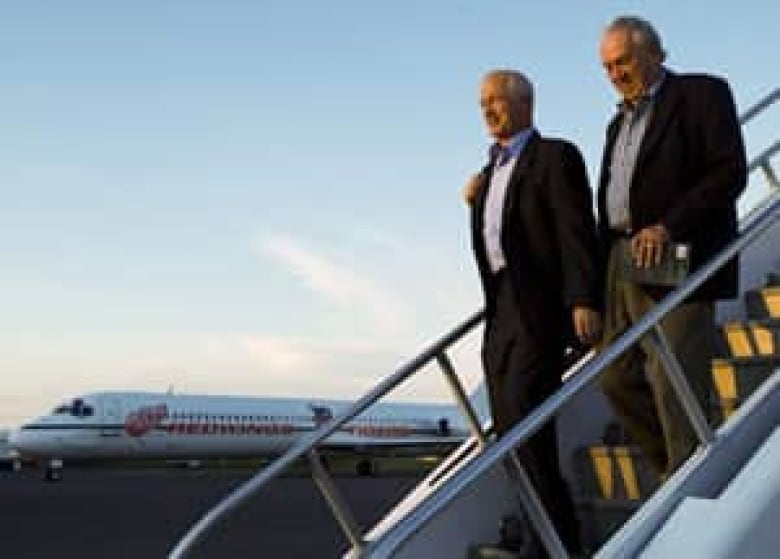Ed Broadbent's career in politics and public life
Ed Broadbent was, for a brief while in the 1980s, the most popular politician in Canada, scoring higher in public opinion polls than then prime minister Pierre Trudeau.

He stepped down as leader of the federal New Democratic Party in 1989 after what he called a disappointing election result. The party had just won the most seats in its history, but Broadbent wanted more.
Broadbent was coaxed back into politics by then NDP leader Jack Layton. Broadbent ran for, and won, a seat in Ottawa Centre in 2004.
He quit politics in 2005 because of his wife Lucille's illness.
March 21, 1936: John Edward Broadbent is born in Oshawa, Ont., to Percy and Mary Broadbent, the second of the family's three children.
1955: Begins studies in philosophy at Trinity College at the University of Toronto.
1959: Completes his bachelor's degree.
1961: Completes his master's degree and joins the NDP. He marries town planner Yvonne Yamaoka. Their marriage would end six years later.
1962: Attends the London School of Economics for a year.
1965: Begins teaching political science at York University in Toronto.
1966: Completes his PhD with a thesis about the 19th-century political philosopher John Stuart Mill.

1968: Is first elected as member of Parliament for Oshawa-Whitby. He would serve in the House for 21 years in this seat. (The riding would later be redistributed and renamed Oshawa.)
1971: Broadbent marries his second wife, Lucille, and becomes stepfather to her son, Paul. They would later adopt a baby girl, Christine. Runs for the leadership of the NDP, losing to David Lewis.
1975: Broadbent, House leader of the NDP, withdraws his name from consideration as party leader. Two months later, the party establishment convinces him to rejoin the race. In July, he defeats Rosemary Brown to become leader of the NDP.
1979: The Progressive Conservatives under Joe Clark win a minority government, with the Liberals and NDP together holding 140 seats to the Tories' 136. The government would fall in December when the budget would fail to pass by a vote of 139 to 133.
1980: The federal election sees the NDP win 20 per cent of the popular vote, but only 32 seats in the House, in Pierre Trudeau's majority Liberal government.
1987: The NDP reaches its highest public approval rating with 41 per cent of support in an opinion poll, compared to the Liberals' 35 per cent and 23 per cent for the governing Tories.
1988: The NDP wins 43 seats in the federal election, its largest caucus ever, but the result is still disappointing to Broadbent, who had predicted the party would be, at least, the official Opposition.
1989: Broadbent steps down as leader of the NDP. He would give up his Oshawa seat on Dec. 31, 1989.
1990: Begins works as head of the International Centre for Human Rights and Democratic Development. He was appointed to the position by Prime Minister Brian Mulroney.
1993: Broadbent is invested as an officer of the Order of Canada. He would be promoted to companion in 2001.

2003: Announceshe'll be a candidatein the 2004 election in the riding of Ottawa Centre. He would win over Liberal Richard Mahoney.
2005: Broadbent announces he won't run in the next federal election because of his wife Lucille's worsening health.
2006: Lucille Broadbentdies after a battle with breast cancer.
2011: In June, Broadbent announces the creation of the Broadbent Institute, a think-tank to study and promote issues of social democracy. He serves as honorary pallbearer at NDP leader Jack Layton's funeral in August and later endorses Brian Topp to succeed Layton.
2012: Broadbent causes a stir with a spirited attack on eventual leadership winner Tom Mulcair.












_(720p).jpg)


 OFFICIAL HD MUSIC VIDEO.jpg)
.jpg)



























































































